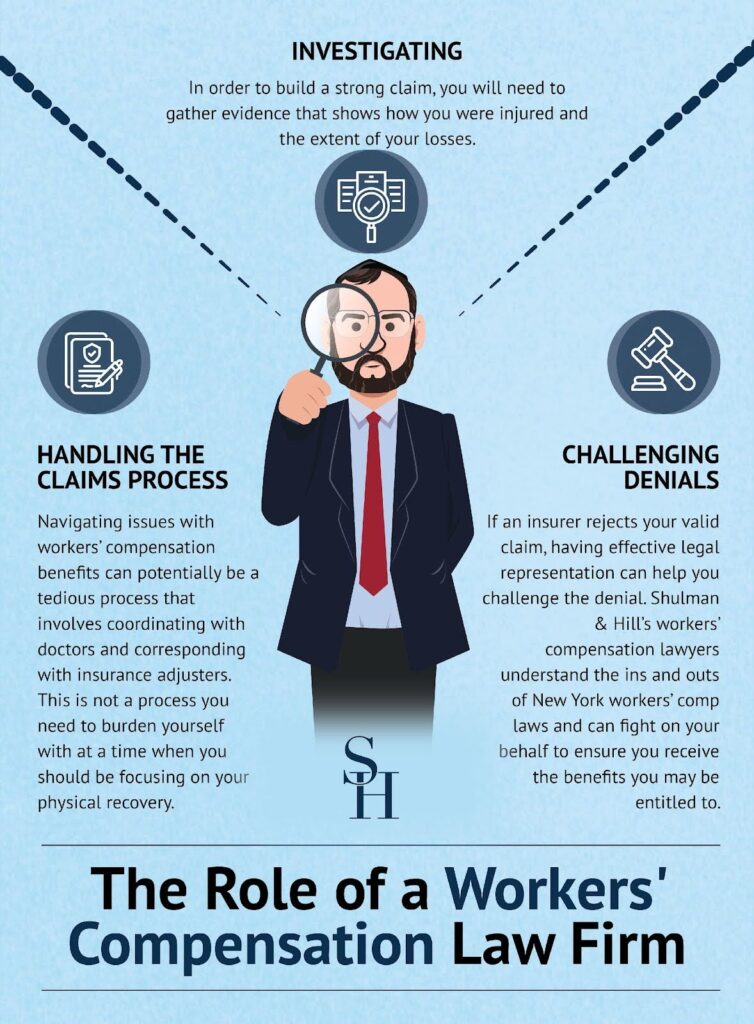At Shulman & Hill, we understand that navigating the New York workers’ comp process can be overwhelming for injured workers. It involves meeting strict deadlines, completing detailed forms, cooperating with investigations, and dealing with potential claim denials and appeals. Without proper guidance, injured workers may struggle to access the benefits they are entitled to.
Our experienced New York workers’ compensation lawyers are here to simplify the process for you. While the process can be complex, it offers valuable benefits like medical coverage and income replacement without requiring proof of employer negligence. Let Shulman & Hill help you navigate the workers’ comp process, ensuring you understand your rights and responsibilities.
The Process of Filing a Workers' Compensation Claim in NYC
The workers’ comp process in New York can be intricate and stressful, especially when dealing with a serious injury. Understandably, you may wonder what to do after a workplace injury. Below are the basic steps in filing a workers’ comp claim in New York.
Notify Your Employer
The first step is notifying your employer of your injury. This must be done within 30 days of the incident, but it is advisable to do so as soon as possible. Prompt notice is crucial to preserving your eligibility for benefits. Delaying this first step could result in losing your right to compensation.
Seek Medical Treatment
You’ll need to seek treatment from an authorized health care provider. Check if your doctor is approved by visiting the Workers’ Compensation Board’s website.
Do not pay out of pocket or use other insurance, as your employer’s workers’ compensation insurance should cover expenses related to your workplace injury or illness. Be sure to keep medical bills and receipts, including the cost of transportation to the doctor.
File the Claim
To start your claim, complete an Employee Claim Form C-3 and submit it to the Board, or contact our office right away to assist you with this crucial step. We can help you fill the form out carefully and properly, providing accurate information.
Insurance Carrier Investigation
After you submit your C-3 Form to the Board, the employer’s insurance company will investigate your claim. They may review medical records, conduct interviews, and more. Cooperation is key, but help from an attorney can ensure your rights are protected.
The Waiting Period
There is a seven-day waiting period before your lost wage benefits kick in. If you miss 8 to 14 days of work, you start receiving benefits from the eighth day onward. If you miss more than two weeks of work, you are eligible for benefits dating back to the first day of your injury.
The Board's Decision
The Board reviews workers’ compensation claims. It may further investigate disputed or denied claims before scheduling a hearing to adjudicate the issue of compensability. It is important to note that the Board makes the final call, not the insurance carrier.

Important Deadlines and Statute of Limitations
Missing deadlines can result in losing your right to benefits, so it is critical to file promptly. Pay attention to these important filing deadlines:
- Notify your employer – Within 30 days of the injury or illness.
- File your claim – Within two years of the injury or illness.
- Appeal a Decision – Within 30 days of the filing of the Decision.
Depending on the facts of your case, occupational illnesses like asbestosis or repetitive stress injuries may have different deadlines. Municipality and local government claims may also have different deadlines, so it’s always best to consult with an attorney.
What if My Workers' Compensation Claim is Denied?
Workers’ comp denials are not uncommon, but don’t give up if your claim is initially rejected by the insurance company. You can still pursue your claim and request that the Board award your benefits.st. Consider hiring an attorney, as navigating the issue resolution process without legal help is challenging. Our skilled workers’ compensation attorneys have extensive experience handling denied claims.
Types of Workers' Compensation Benefits in New York
If approved, available benefits include:
- Wage replacement benefits – Subject to a cap, these benefits replace a portion of your usually two-thirds multiplied by your degree of disability. You may also be entitled to benefits if you work fewer hours and earn less due to your injuries. You may also be entitled to benefits if you work fewer hours and earn less due to your injuries.
- Medical benefits – Workers’ comp covers all approved medical costs related to your injury, such as doctor visits, physical therapy, hospitalization, medication, and medical equipment.
- Survivor benefits – If a work injury is fatal, surviving dependents can receive death benefits, including some burial costs.
How Does Workers' Comp Pay in New York?
Typically, you receive payments of wage replacement benefits every two weeks while disabled. The insurer should notify the Board if payments stop. In some cases, you may receive a lump sum payment. If you are facing delayed or disputed payments, our attorneys can help you secure the compensation you deserve.
New York Workers’ Compensation FAQs
To learn more about the workers’ comp process in New York, explore our Workers’ Compensations FAQs, including:
- How does your citizenship status affect workers’ compensation benefits?
- What is the difference between a workers’ comp claim vs. a personal injury lawsuit?
- Can you lose your job while on workers’ compensation?
- How long does workers’ compensation last in New York?
Work With Shulman & Hill To Navigate The Workers' Compensation Process
We can assist with every step of your workers’ comp claim, from filing initial paperwork to handling investigations and denials. We’ll handle all the legal processes so you can focus on your recovery. Call (212) 221-1000 or contact us online to schedule a free, no-obligation consultation. We are here to help.